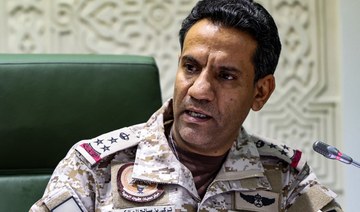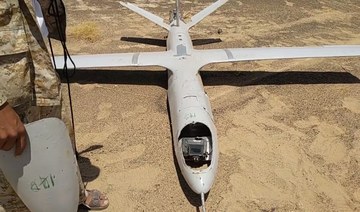RIYADH: Coalition air defenses intercepted an explosives-laden drone launched by Yemen’s Houthi militia toward Saudi Arabia late on Saturday, the alliance command center said early Sunday.
In a statement carried by state TV Al-Ekhbariya, the coalition said the weaponized UAV was aimed at the southern Saudi city of Khamis Mushait along the border with Yemen.
It was the latest in a series of missile and drone attacks by the Iran-backed militia against Saudi Arabia since the Kingdom spearheaded a coalition to restore the UN-recognized government in 2015.
Ignoring calls to support the peace negotiations being brokered by the UN, the militia has also refused to end its offensive in the city of Marib.
Brig. Gen. Turki Al-Maliki on Saturday dismissed as “fabricated” video footage released by the Houthi movement claiming an incursion by its fighters into a Saudi Arabian border area on the frontlines.
The Arab Parliament condemned the attacks in a statement on Saturday, adding that the repeated hostilities not only threatened the Kingdom, but also posed a danger to regional security and stability.
The Organization of Islamic Cooperation (OIC) strongly condemned the Houthi militia’s continued launching of drones to target populated areas in the Kingdom.
Secretary-General Dr. Yousef Al-Othaimeen said the OIC supports all measures taken by the coalition forces to protect civilians and civilian objects.
The Muslim World League (MWL) said these repeated attempts by the Houthis to threaten the Kingdom’s security and stability and global trade require the international community to combine its efforts to put an end to these terrorist risks that are backed by Iran.
“On behalf of the councils, groups and bodies around the world, the Muslim World League stands by Saudi Arabia and fully supports the measures it takes to defeat terrorism in all its forms and manifestations, and to preserve its security and stability and that of the region and enhance peace,” said MWL Secretary-General and and President of the Association of Muslim Scholars Mohammed bin Abdul Karim Al-Issa in a statement.
Al-Issa also condemned the militia’s “hateful and threatening sectarian tendencies,” their deliberate starvation of the Yemeni people, and the recruitment of Yemeni children as a flagrant violation of religious and humanitarian values, as well as international laws.
The UAE denounced the attempted targeting of Khamis Mushait and said the continuation of these terrorist attacks by the Houthi militia reflects its blatant defiance of the international community, its disregard for all international laws, and provides new evidence that these militias are seeking to undermine security and stability in the region.
Bahrain also issued a similar statement.
Saudi air defenses intercept Houthi drone aimed at Khamis Mushait
https://arab.news/g227c
Saudi air defenses intercept Houthi drone aimed at Khamis Mushait

- It was the latest in a series of missile and drone attacks by the Iran-backed militia against Saudi Arabi
- The OIC says it supports all measures taken by coalition forces to protect civilians and civilian objects
KSrelief continues humanitarian efforts in Yemen, Sudan, and Lebanon

RIYADH: Saudi aid agency, KSrelief, continued efforts to help vulnerable individuals and families this week in Yemen, Sudan and Lebanon, the Saudi Press Agency reported on Friday.
In Yemen, KSrelief distributed 90 food packages in Lahij Governorate, and 100 tents, 270 shelter bags and 618 food parcels in Marib.
In Sudan, the agency handed out 900 food packages to the displaced and neediest families in River Nile State, benefiting 5,177 individuals.
KSrelief continued implementing the Al-Amal Charitable Bakery project in Akkar Governorate and Al-Minieh District, north of Lebanon.
In its fourth phase, the project distributed from July 18-24 about 25,000 bags of bread daily to needy Syrians, Palestinians and the host community living in Northern Lebanon, benefiting 12,500 families.
Aqabat Shaar: Iconic Saudi mountain road a lifeline for Asir’s rugged beauty

- The road through Aqabat Shaar connects the highlands of Sarat Asir with the coastal plain of Tihama
- It is a vital conduit for travel, commerce, and tourism, connecting communities while showcasing the natural splendor of the region
RIYADH: Nestled in the heart of Saudi Arabia's southwestern region of Asir, Aqabat Shaar is one of the most iconic highways, celebrated for its breathtaking natural scenery and vital tourist attractions.
This mountainous area, known for its rugged terrain, used to pose significant challenges to access and mobility, which led to the creation of a road that has become indispensable to residents and visitors alike, linking the region to neighboring areas and governorates.
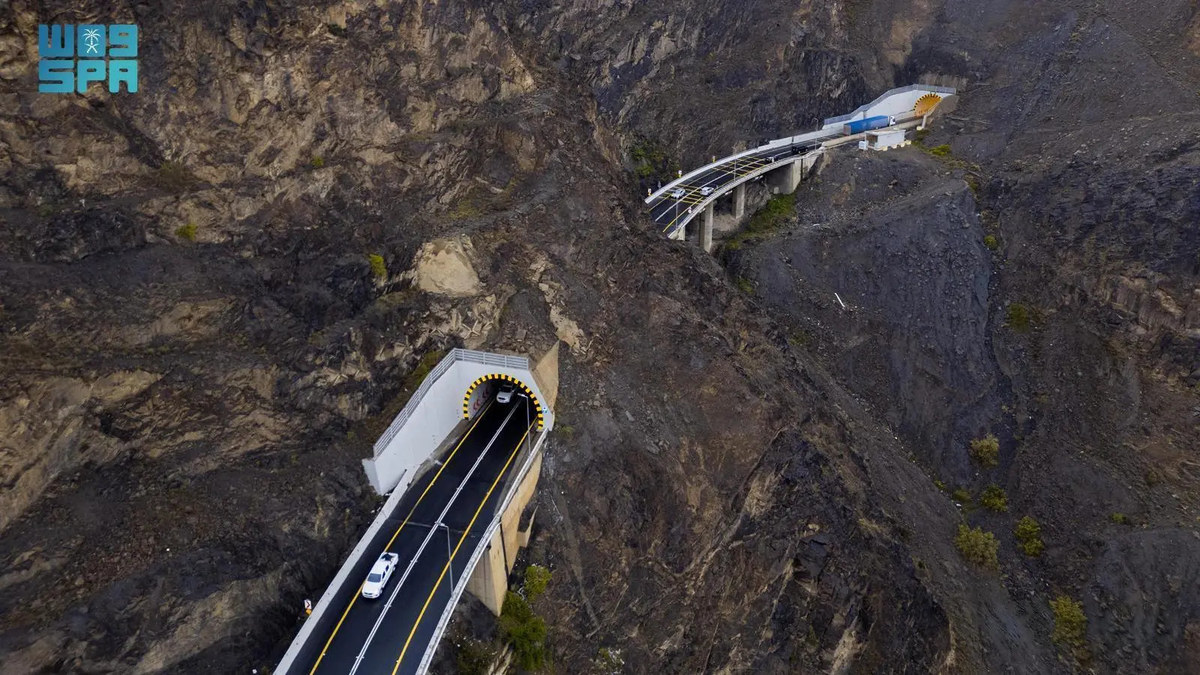
A mere 23 kilometers from Abha city, the road through Aqabat Shaar connects the highlands of Sarat Asir with the coastal plain of Tihama. This crucial artery not only reduces travel time, but also plays a pivotal role in bolstering tourism in the region. Furthermore, it enhances the Kingdom’s standing as a global logistics hub by facilitating the seamless movement of trucks transporting a wide array of goods.
The construction of Aqabat Shaar began over 40 years ago, under the reign of the late King Fahd bin Abdulaziz. This monumental project involved cutting through solid rock, creating 11 tunnels, and erecting 32 bridges, resulting in a road approximately 14 kilometers long. The endeavor was a marvel of engineering at the time, designed to navigate the challenging topography and ensure reliable access.
The road recently underwent significant development to enhance its utility and safety. The Roads General Authority spearheaded a comprehensive maintenance project incorporating the latest international technologies and standards. This effort entailed a temporary closure of the road, which reopened last year to much acclaim.
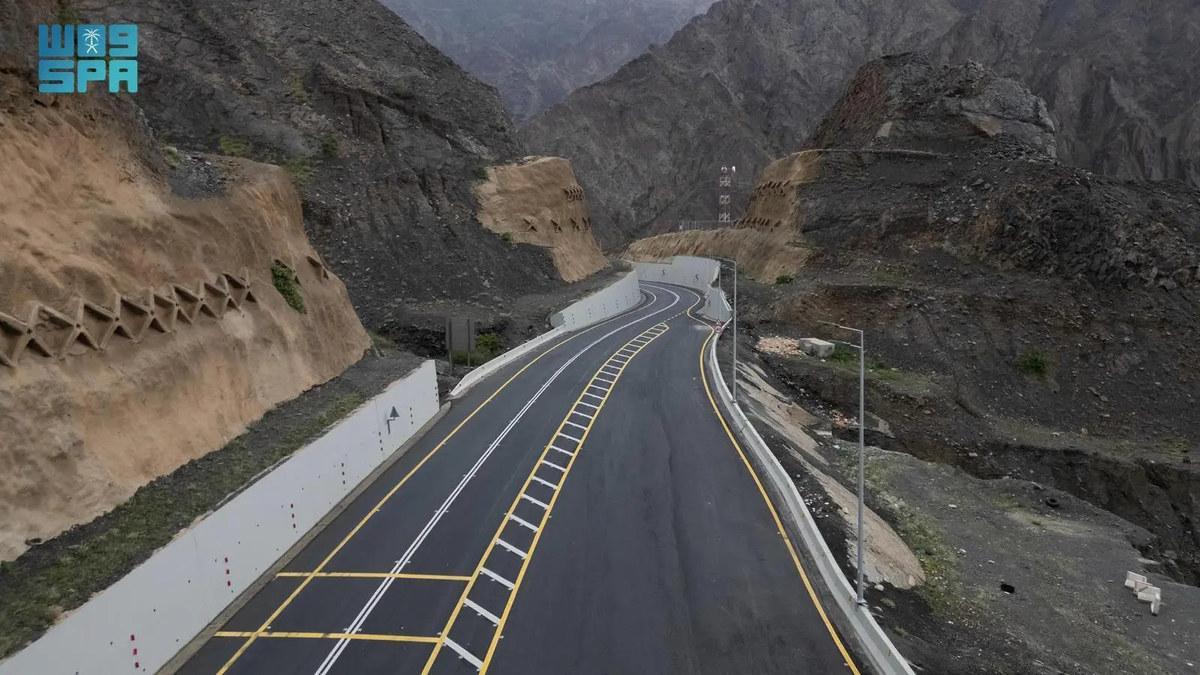
The recent maintenance work on Aqabat Shaar focused on achieving the highest standards of quality and safety. Enhancements included the installation of modern lighting, clear road markings, informative signs, and warning vibrations. Additionally, concrete barriers were erected to improve road safety, ensuring that the road meets the increasing demands of the region’s expanding network.
Aqabat Shaar is not just a road; it is a testament to human ingenuity and determination carving a path through some of the most formidable terrain in Asir. It is a vital conduit for travel, commerce, and tourism that serves and connects communities while showcasing the natural splendor of the region.
As it evolves with ongoing developments, Aqabat Shaar remains a beacon of progress, illuminating the way forward for Asir's dynamic future.
ThePlace: Wadi Wajj, Taif’s historic water oasis

- Once a geographical divider splitting the city of Taif in two, it has evolved into a popular tourist destination
TAIF: Wadi Wajj, a revered valley in Saudi Arabia's western governorate of Taif, boasts a rich tapestry of history and natural beauty.
Once a geographical divider splitting the city of Taif in two, it has evolved into a popular tourist destination renowned for its lush gardens, vibrant orchards, and breathtaking panoramas.
Professor Saleh Al-Khalif, an expert in Islamic history and civilization, said Wadi Wajj's has played a vital role in agriculture and its proximity to Makkah accounts for its historical significance.

The region's ancient irrigation systems, including hundreds of springs and wells, are a testament to its innovative water management practices.
Wadi Wajj's water resources have been instrumental in the area's development, fostering agriculture and infrastructure.
The valley's enduring springs continue to irrigate farms and support the local economy, underscoring its enduring importance to Taif.
Saudi Arabia joins 80 countries in historic deal on e-commerce

- First digital global rules include recognition of e-signatures and protection against online fraud
- The agreement also includes a component providing preferential treatment to developing countries
JEDDAH: About 80 countries including Saudi Arabia reached a historic agreement on Friday on rules governing global digital commerce, including recognition of e-signatures and protection against online fraud.
“We negotiated the first global rules on digital trade,” EU trade chief Valdis Dombrovskis said after the deal in Geneva following five years of negotiations.“This will facilitate e-transactions, boost innovation, and integrate developing countries into the digital economy,” he said.
Britain said the agreement would commit all participants to making customs documents and processes digital and recognizing e-documents and e-signatures, and put in place legal safeguards against online fraudsters and misleading claims about products.
Once in place, the deal “will make trade faster, cheaper, fairer and more secure,” Britain said in a statement.
The text of the agreement says the parties will seek to limit spam and protect personal data, as well as offer support to least-developed countries.
Ninety-one of the World Trade Organization’s 166 members took part in the negotiations, including Saudi Arabia, China, Canada, Argentina and Nigeria.
Digital commerce is growing far faster than its traditional counterpart.
The OECD group of economically developed nations says it estimated that in 2020, e-commerce already made up a quarter of global trade, making it worth just under $5 trillion.
Despite its growing importance, “no common set of global rules exist,” said British Trade Secretary Jonathan Reynolds.
Finalizing the negotiations “is a huge step forward in correcting that and ensuring British businesses feel the benefit.”
The talks were launched in 2019, with around 90 negotiating countries — representing 90 percent of the WTO membership — including heavy-hitters like the United States, the European Union and China.
Australia, Japan and Singapore, which have jointly been leading the Initiative on Electronic Commerce talks, presented a joint statement during a closed-door meeting at the WTO confirming that “after five years of negotiations, participants had achieved a stabilized text.”
But actual implementation of a deal could still be years off.
A small number of negotiating countries have yet to sign on, including the United States, Brazil, Indonesia and Turkiye, the declaration said.
“The text released today ... represents an important step forward for the WTO in a sector of growing importance to the global economy,” US ambassador and Deputy US Trade Representative Maria Pagan said in a statement.
But the United States considers that “the current text falls short and more work is needed,” she said, pointing in particular to an “essential security exception.”
The co-conveners of the talks have in recent months stressed the importance of landing a deal, stressing it could facilitate electronic transactions, promote digital trade and foster an open and trusted digital economy.
“This would be the first-ever set of baseline digital trade rules,” Singapore’s ambassador to the WTO Tan Hung Seng said in April.
“It would contribute to the growing e-commerce in our countries by providing greater legal predictability and certainty, against the backdrop of increasing regulatory fragmentation,” he said.
In Friday’s statement, UK Science Secretary Peter Kyle said the agreement aimed “to help people use technology safely by protecting them from fraud, while driving economic growth through the digitalization of trade so it’s faster and more secure.”
Preferential treatment
The agreement also includes a component providing preferential treatment to developing countries.
In addition to paving the way for digitalising customs documents and processes, the text also seeks to make permanent a long-held moratorium exempting electronic transactions from customs duties.
The moratorium has been in place since 1998, and has been extended at each WTO ministerial meeting since. It is currently set to expire in 2026.
“Once in force the agreement will permanently ban customs duties on digital content,” the British statement said.
The aim is to incorporate the digital trade rules into the WTO legal framework, but that would require consensus backing from all members, including those not part of the deal.
That could be tricky at a time when countries like India and South Africa are balking at what they see as a proliferation of plurilateral agreements within the WTO rather than the all-but-impossible multilateral deals backed by all members.
One solution, observers say, could be for the signatories to move the agreement to another international body. But if they do that, they would not be able to rely on the WTO’s mechanism for resolving trade disputes.
(With Agencies)
Saudi ballet star, 18, dances to inspire dreams

- Halaa Nagadi desires to represent Kingdom on world stage
- Hopes others ‘embrace this beautiful and expressive art form’
RIYADH: Saudi Arabia ballet dancer Halaa Nagadi, 18, is captivating audiences with her unwavering passion and hopes others would be inspired to “embrace this beautiful and expressive art form.”
She is currently preparing for the 2024 Dubai International Dance Competition set to start on Nov. 17 that will have professional and amateur dancers participating from all over the world.
“I became interested in ballet when I was on a journey to find a dance form that truly resonated with me,” Nagadi told Arab News. “The way ballet dancers could convey such powerful emotions and narratives through their bodies was simply captivating.”
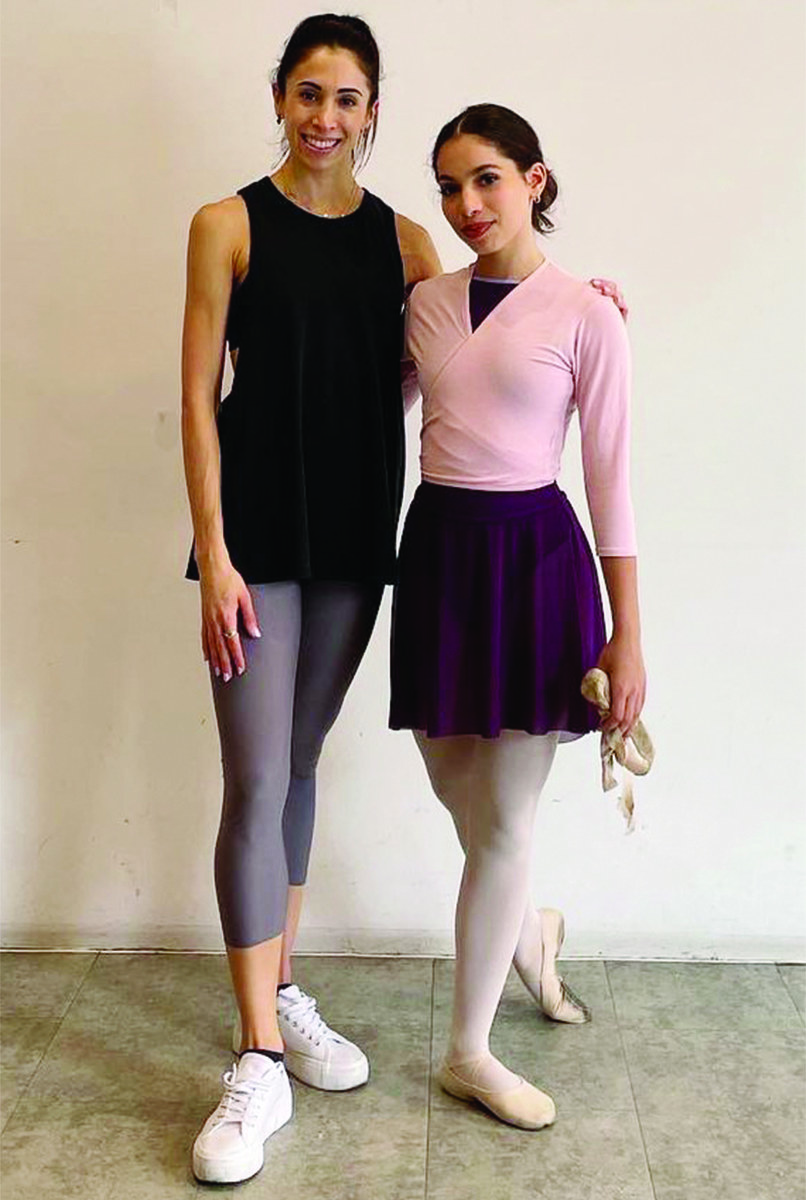
From a young age, Nagadi was mesmerized by the graceful movements and emotive storytelling of ballet, and she has pursued her dream with determination.
“One of my greatest goals is to represent Saudi Arabia on the international ballet stage,” Nagadi said. “I want to showcase the talent and artistry that exists within our country, and inspire others to embrace this beautiful and expressive art form.”
FASTFACTS
• Though ballet may not have been a typical path for a young Saudi Arabia woman, Nagadi was undeterred.
• She immersed herself in studying ballet, first through online videos and then by seeking out local and international training opportunities.
Though ballet may not have been a typical path for a young Saudi Arabia woman, Nagadi was undeterred. She immersed herself in studying ballet, first through online videos and then by seeking out local and international training opportunities.
“Balancing my studies in tourism and event management at King Abdulaziz University with my rigorous ballet training has not been an easy task,” Nagadi revealed.
“But I’ve remained steadfast in my pursuit, spending four to eight hours each day honing my skills, whether it’s at the ballet studio or the gym, ensuring that I am constantly improving and pushing the boundaries of my craft.”
Nagadi’s journey has not been without its challenges, however. Finding suitable ballet facilities in Saudi Arabia has been a significant hurdle, and sourcing specialized equipment is proving to be an ongoing obstacle, she explained.
Undaunted, Nagadi has sought out opportunities abroad, including a summer program in Romania and a ballet performance opportunity in Turkiye.
“I also took a masterclass for professional dancers from the principal of the Royal Ballet in London,” she added.
Nagadi’s dedication and passion have not gone unnoticed locally. “I have received the support of the Saudi Ministry of Culture, who have provided me with opportunities to showcase my talents at local events, such as the Taif Rose Festival and a theatrical performance that fused Arabic music with ballet,” she said.
As Saudi Arabia’s arts and culture scene continues to evolve, the ballet talent envisions a future where the dance form will flourish and draw audiences from across the Kingdom.
“I believe the ballet scene in Saudi Arabia will only continue to grow and develop,” she said. “More and more people are becoming interested in learning and practicing this art form.”
Nagadi’s unwavering determination has not only earned her recognition within the Saudi Arabia arts community but has also inspired a new generation of young people to explore the world of ballet.
Her story is a reminder that with hard work, dedication, and a willingness to challenge societal norms, anything is possible.



